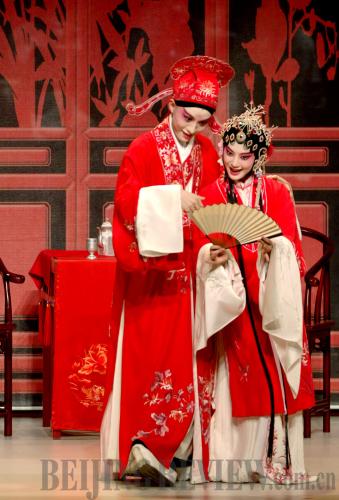|
 |
|
LOVE SCENE: Actor and actress for the characters of Hou Fangyu and Li Xiangjun on stage for the performance of Kungqu opera version of Peach Blossom Fan (LUO XIAOGUANG) |
It is about a love story between a poet and a courtesan in the late Ming Dynasty (1368-1644). It emanates from a true story written by a playwright in 1699. It has been handed down from one generation to another over 300 years and remains alive on the stage with great attention in modern society.
On November 30, the Peach Blossom Fan showed up once again onstage at the National Center for the Performing Arts, located in Beijing. Different from the former performing art of Kunqu, a traditional Chinese opera, this time it takes the form of oratorio.
In this performance, the audience saw two groups of Hou Fangyu, the poet, and Li Xiangjun, the courtesan, one with heavy facial opera makeup and one with modern dresses. The elements of ancient and modern, Chinese and Western have broken down the blocks of time and space to combine together on the stage.
This is not the first time this story has been introduced with new forms. Since its performing tour in Europe and Asia in 2006, this story has had quite a few forms—including a youth edition with younger people involved in the acting, as well as musical editions with some modern concert aspects to the performance.
This time, however, the oratorio version combines an unprecedented Kunqu opera with the Western traditional capella, which applies the Aria and tune of the Chinese Kunqu opera and the form of oratorio. By using an alien, artistic form to interpret Chinese traditional operas, through the practices of musical creation and stage play, the Peach Blossom Fan innovatively explores and creates a musical language that integrates Chinese and Western styles.
"I read Peach Blossom Fan when I was just 11 years old and was deeply impressed by it," said Liao Naixiong, the composer of Capella Oratorio Peach Blossom Fan. "The charm of the story not only relies on the story itself, but also the social backgrounds it reflects and the beautiful words. It is of great literary value."
One of the greatest works in the history of Chinese drama and literature, and a masterpiece of Kunqu opera, it was written by Kong Shangren, the 64th descendant of Confucius. After 10 years of hard work, it was finished in 1699.
With the couple's love story as a thread, it reflects the splendor and fall of the Ming Dynasty as a historical epic. Hou met Li in a city in east China and got engaged. Hou had been involved in a coup against the imperial throne, and was thus forced to flee. When Li was forced to marry another man of political power, she knocked her head on the ground to refuse and spattered blood on a fan, which Hou gave her as a gift. A painter, in turn, used the bloodstains to depict flowers—and herein comes the name of the Peach Blossom Fan. Finally, the couple reunited when the country was in ruins—but heartbroken by the falling of the nation, they both became Taoists in the temples.
Once this story was finished, the play was widely spread among the imperial nobility and was then first performed by a prestigious Kunqu opera troupe, which made it a great hit in Beijing.
From then on, it became one of the masterpieces of Kunqu opera, which dominated Chinese theater from the 16th to 18th centuries, and has exerted a profound influence on the development of other theatrical forms, including Peking Opera.
Thus Kunqu opera is now regarded as the "ancestor" of many other operas in China, and in 2001, Kunqu was recognized as a Masterpiece of the Oral and Intangible Heritage of Humanity by UNESCO.
"From the very beginning, Kunqu opera was only popular among the noble class and regarded as the high arts," said Liao. "Now, we combine modern elements with it to make it more accepted and show its unique beauty."
In 2007, inspired by the performance of the play he watched in Nanjing, Liao got the idea of composing oratorio for it.
"The communication of Eastern and Western cultures has been conducted in many fields for many years, (as well as) in the musical field," he said. "It's good to try to combine our traditional musical elements with those of Western music to tell our ancient classic stories." | 